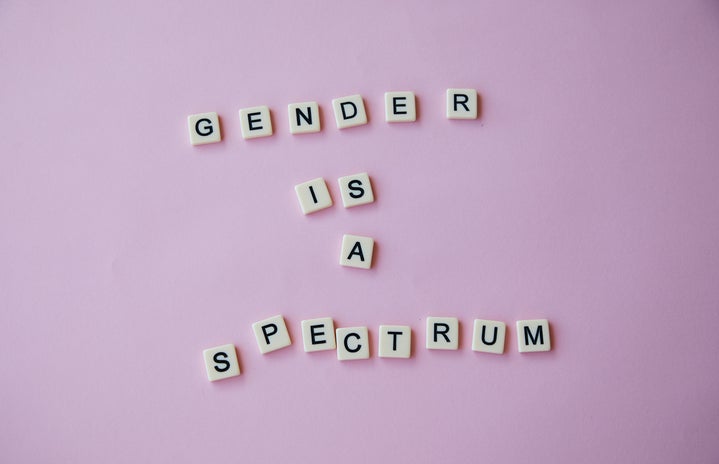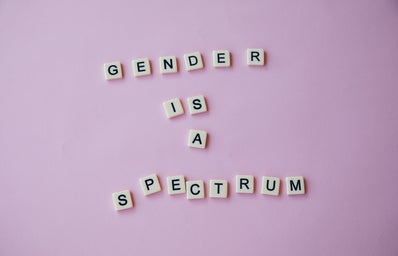The modern gender binary is relatively new. While previous ideas of gender were far from unproblematic, the binary of two genders–woman and man–and the superiority of men was not set in stone until around the 1500s. Even then, this binary wasn’t present outside of European countries, until–you guessed it–European countries began to colonize the rest of the world.
I’ve previously written about how colonization stripped Indigenous communities of their unique gender identities for so long that they lost the original words in their languages for them, leading to the use of the gender identity and term Two-Spirit. Colonization, which was mainly carried out by European countries that were predominantly Christian, sought to assimilate Indigenous peoples with European culture, which resulted in killing Two-Spirit individuals and forcing women and men to conform to the European ideals of gender. This meant cutting the men’s long hair, which has cultural significance, and dressing the children in specific gendered clothes. To read more about this you can check out my other article here, which includes resources written by Indigenous people.
However, colonization did not only strip the unique gender identities of Indigenous peoples. We can also see this erasure of unique identities in the colonization of India by the British. The main religion in India, Hinduism, is the oldest recorded religion in the world; one of their main scriptures, the Vedas, has been dated to 6000 BCE, making it the oldest scripture in the world. Taking into account all of the ancient Hindu scriptures, nowhere does it state that homosexaulity or being LGBTQ+ is something unnatural or shameful. The Vedas mention a “third gender” and distinguishes sexual acts simply by whether they are procreative or not. The Vedas also allow transgender individuals to live their life as they choose, valuing and supporting them. Another Hindu text, the Mahabharata, includes epic tales of Shikhandi and Brihannala, which show that gender identity on a wide spectrum was accepted and celebrated. The seven vows of a Hindu marriage does include procreation, but these are only meant to be guidelines, and there are many ways in which this vow can be interpreted. Overall, individuals who identify as a ‘third sex’ (the names for this differ by geographical area), were honoured and traditionally were not ostracized, and this was also the case in Indigenous cultures before colonization and Christianity came along.
Some modern Indian laws are deeply homophobic and transphobic. Now, you may be wondering how a country with a predominantly Hindu population–which, as we’ve just discussed, is a fairly LGBTQ+-friendly religion–can have such homophobic laws, and I can tell you it’s because of colonization and Christianity. The British colonization of India meant the implementation of British ideals as law. These ideals were heavily influenced by Christianity, and more specifically Catholicism. The law which punishes same-sex relationships as well as being transgender in India is Section 377, which was introduced by the British in 1860 during British rule. Section 377 penalized actions “against the order of nature,” which included all LGBTQ+ sexual acts. Section 377 was unanimously repealed in 2018, which marked the largest decriminalization of LGBTQ+ people in history. While this a huge win for the LGBTQ+ community in India, it doesn’t change the societal acceptance (or lack thereof) of LGBTQ+ people overnight. While India has passionate LGBTQ+ activists who succeeded in overturning Section 377, homophobia and transphobia are still widely present in India, including among those of the Hindu faith. Colonization has had such a lasting effect on India and on Hindu culture, putting a law in place that went against the most prevalent religion in the country and lasted over 150 years.
Something similar happened to African countries who are part of the Commonwealth or who used to be, and some still are under British rule. Let’s look at Botswana, which recently decriminalized homosexuality, to show colonization’s effect in certain countries in Africa. In June of 2019, the High Court of Botswana voted to overturn a law that criminialized homosexuality, which had been in place since the late 1800s. The law, Section 164, penalized “unnatural offenses” which went “against the order of nature.” The wording is nearly identical to that of Section 377 of India’s penal code. This is only one example of the lasting effects of British colonization on otherwise accepting countries. The judge who overturned Section 164, Judge Leburu, called this anti-homosexality law a “British import” and stated that it had been implemented “without consultation of local peoples.”
Like Indigenous and Hindu cultures, many African cultures had very accepting views of LGBTQ+ people, especially those who did not fit the gender binary. Examples of this can be found in excavations of ancient Egyptian tombs, as well as Egyptian deities and prominent figures. People like the Yoruba and Igbo, who mainly live in present-day Nigeria, did not assign gender at birth. Neither did the Dagaaba people, who live mainly in present-day Ghana. Many places even had openly LGBTQ+ monarchs, like King Mwanga II, who was a king of present-day Uganda. Of course, this is not true of all places in Africa, as the reasons for homophobia and transphobia in any country are multifaceted and complicated, but the fact remains that many places did not have laws criminalizing the LGBTQ+ community until colonization. Importantly, these statements cannot be generalized to all of Africa because each country is unique and has its own history influenced by many people, religions, and events.
In historical and modern contexts, missionaries and preachers who come to African countries looking to convert people to Christianity, or believing that people in African countries need to be “saved”–which of course could not be further from the truth–aggravate and leverage already anti-LGBTQ+ attitudes in order to push their agenda. Again, Africa is not a monolith and none of this information can be extrapolated to ALL African countries because they all have a unique history concerning both gender and homophobia.
No matter what anti-LGBTQ+ attitudes existed in Global Southern countries in pre-colonial times, the gender binary did not exist anywhere other than in Europe until certain countries came under British rule.
While colonization alone may not be responsible for the formation of the gender binary, it certainly sparked its creation in many countries across the world.
Sources
https://www.hinduamerican.org/press/haf-policy-brief-hindu-teachings-inclusive-lgbt-people
https://www.hrc.org/resources/stances-of-faiths-on-lgbt-issues-hinduism
https://www.stonewall.org.uk/about-us/news/african-sexuality-and-legacy-imported-homophobia


